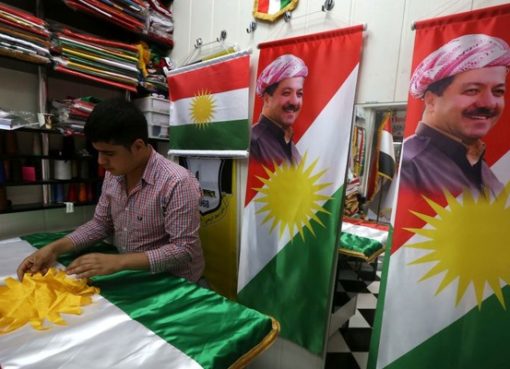Attempts to control a monetary crisis have had unintended consequences for a country struggling to get back on its feet
By Raya Jalabi in Sulaimaniya, Iraq
Iraq is struggling to control a crippling currency crisis that has roiled the country for months, underlining the fragility of its oil-dependent economy 20 years on from the US-led invasion. Ali Mohsen al-Allaq, the new central bank governor, defended measures introduced to stabilise the monetary crisis that has led to an acute shortage of US dollars and a sharp fall in the dinar. “We’ve focused on resolving the root of the problem and we’re seeing some positive indicators,” Allaq said in an interview, referring to central bank and government efforts to calm the panic that has taken hold since the crisis erupted in November. This was when Iraqi’s authorities, with the US, implemented tough rules for banks as part of efforts to stamp out money laundering and surreptitious cash flows abroad. But the package of measures had unintended consequences, including drastically cutting the dollar supply in an economy where the US currency is heavily favoured, pushing up inflation and creating hardships for Iraqis who trust neither their institutions nor their own currency. Hamoody Ismail, 27, a personal trainer in Baghdad, said he was struggling to find the $4,300 he was due to pay in rent and business payments. “My landlord refuses to take dinars and I’ve spent several days this week trying to find dollars.” Iraq’s vulnerable economy is almost entirely dependent on shifts in global oil prices. Record oil revenues have swelled the coffers of Opec’s second-largest producer to more than $100bn, although Baghdad can only access the money through the US Federal Reserve that has held Iraq’s foreign exchange reserves since the 2003 invasion that toppled Saddam Hussein. Ali Mohsen al-Allaq, governor of the Central Bank of Iraq © Sabah Arar/AFP/Getty Images Under the arrangement, Iraq’s central bank requests its dollars from the Fed and sells them to commercial lenders and exchange houses for dinars, a process known as the daily dollar auction. But US and Iraqi officials have long complained that widescale fraud allowed large sums to be taken out of the country, with some of the dollars ending up in the hands of armed groups under US sanctions in Iran, Syria and Lebanon. “We’ve seen, unfortunately, a growing number of suspicious transactions . . . huge amounts of wire transfers leaving the country with obviously fraudulent basis,” David Burger, a senior US official in Baghdad, said this month. These concerns were renewed last year after $2.5bn in dinars was stolen from the country’s tax authority, with some of that cash used to buy US currency via the auction process. After the scandal, four Iraqi banks suspected of money laundering were barred from participating in the dollar auctions. Soon after, the remaining banks were mandated to abandon paper-based methods for a more transparent digital platform for wire transfers. However, some banks and merchants were unwilling to divulge end-recipients’ details, while others have been slow to adapt to the rules. With so many transfer requests from Iraq’s accounts at the Fed being rejected, it has reduced the supply of dollars to the market. The volume of such transfers has dropped from a daily average value of $180mn in 2022 to between $65mn-$75mn this year, according to central bank data. Allaq, however, said there were signs of progress. “We’re seeing the number of transactions on the digital platform steadily rise . . . we’re seeing more Iraqi merchants officially register to participate.” However, experts cautioned that it could take many months before Iraqi banks fully adapted, and years for the economy to move away completely from informality and the dominance of cash. The government in February revalued the dinar from ID1,460 to the dollar to ID1,320 to the dollar, but its value on the parallel market, where most Iraqis source their dollars, remains about 18 per cent lower. After the US invasion of Iraq in 2003, foreign investors flocked to the country’s abundant oilfields and contracts were doled out, filling Iraqi state coffers © Nabil al-Jurani/AP Other measures aimed at tackling the monetary crisis have exacerbated the problem. These include prohibiting cash machine withdrawals in dollars and cracking down on money changers who price their dollars higher than the official rate. Another scheme was introduced allowing travellers to exchange dinars for up to $7,000 at airports for use abroad. This led to money changers booking flights they would not take just to access the US currency, to then sell on the black market. Recommended Argentina Argentina to launch ‘Malbec dollar’ exchange rate to spur wine exports “For weeks we’ve seen flights to Amman or Beirut that are sold out on the system but the planes are empty,” said an airline employee at Baghdad airport. The loophole was tightening last week, with the maximum sum cut to $2,000. Some of those dollars have ended up in Lebanon, gripped by its own economic crisis. One money changer explained that, for weeks, he has been sending dozens of Iraqis to withdraw dollars at Baghdad’s airport daily to bring them to Lebanon. “We make about $1,200 off every $10,000 brought in from Iraq.” Allaq, the central bank chief, said: “Our biggest problem is that Iraqis rely on cash dollars. Is it not strange that a person pays with a foreign currency in their own country? “The whole world is moving towards abandoning cash and Iraq must do that too.”
Source: Financial Times, 27. March 2023
https://www.ft.com/content/e42fe1ff-80f3-4d5b-b182-7812761c87ad








Comment here